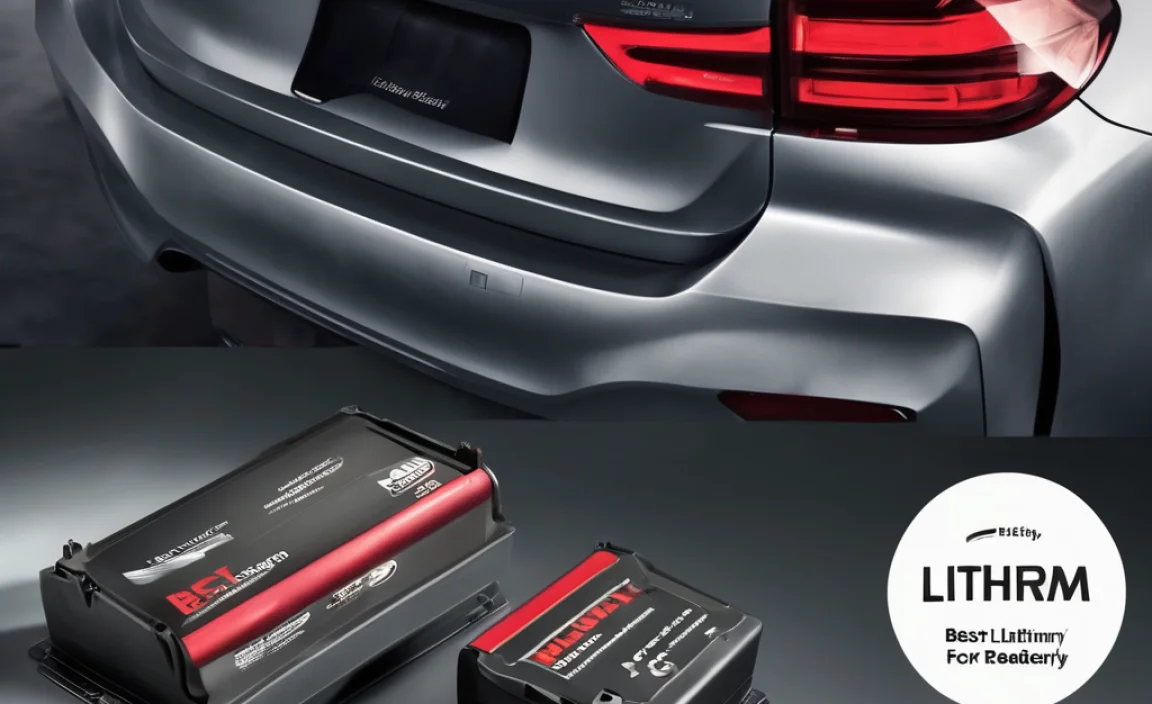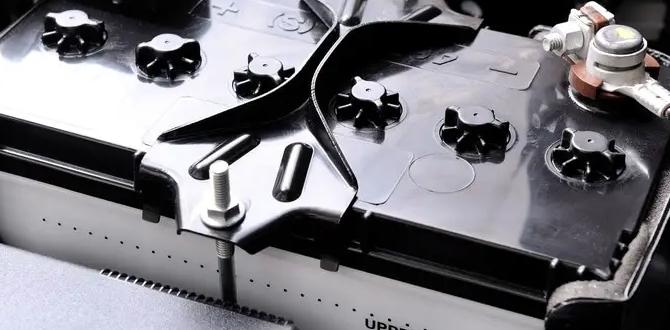Quick Summary: Finding a truly cheap hybrid car battery under $100 is extremely rare for a complete, functional unit. While new hybrid batteries are expensive, look for tested used options, refurbished batteries, or focus on optimizing your current one, as prices under $100 are typically for individual cells or components, not a full system. Smart maintenance is key to saving money.
Cheap Hybrid Car Battery Under $100: Essential Savings
Is the dashboard warning light on your hybrid car flashing? Or maybe you’ve heard that dreaded clunking sound that suggests your battery is on its last leg? For many hybrid car owners, the biggest worry is the cost of replacing that vital component. Hybrid car batteries are much more complex and, frankly, much more expensive than your standard car battery. The thought of shelling out thousands of dollars can be daunting. But what if there was a way to find a cheap hybrid car battery under $100? This guide is here to help you navigate the world of hybrid batteries, understand the costs, and explore the smart, affordable options available to keep your hybrid humming without breaking the bank. We’ll demystify battery types, lifespans, and the truly realistic savings you can achieve.
Understanding Hybrid Car Batteries: It’s Not Like Your Old Car
Before we dive into “cheap” options, it’s crucial to understand what makes a hybrid car battery different—and usually more expensive—than the one in a traditional gasoline car. Your regular car uses a single, relatively simple 12-volt lead-acid battery to start the engine and power electronics. A hybrid, on the other hand, uses a much larger, more sophisticated battery pack, often a combination of nickel-metal hydride (NiMH) or lithium-ion (Li-ion) cells, to do two main jobs:
- Power the electric motor for acceleration and low-speed driving.
- Recapture energy during braking (regenerative braking) to recharge itself.
This dual role means these batteries are designed for deep cycling (repeatedly discharging and recharging) and are built with many individual cells working together. That’s why a complete hybrid battery pack is a significant investment. The search for a “cheap hybrid car battery under $100” often leads to confusion, as this price point is rarely achievable for a fully functional, installed battery pack.
What Does “Under $100” Really Mean for Hybrid Batteries?
Let’s be upfront: finding a complete, working hybrid car battery pack for under $100 is extremely difficult, bordering on impossible, for a reliable, tested unit. When you see prices this low, it usually refers to:
- Individual Cells: A hybrid battery pack is made of dozens or hundreds of small battery cells. You might find single cells or small groups of cells for under $100, but you’d need to be an expert to test, assemble, and recondition them into a working pack, which is typically not a DIY beginner task.
- A Single Component or Part: It could be a sensor, a bus bar, or a small connector that’s part of the larger system.
- Used, Untested Batteries: Some listings might show very old, used batteries with no warranty, pulled from a scrapped vehicle. These are a significant gamble.
- Promotional “Loss Leaders”: Occasionally, a company might offer a very low price on one specific part to attract customers, but it’s rarely the complete solution.
For the average driver, aiming for a complete battery replacement under $100 isn’t a realistic starting point. Think of it like buying a single car tire for $20 – it’s a component, not a full set. However, there are ways to save significant money on hybrid battery replacement, and we’ll explore those realistic “savings” options.
Realistic Ways to Save on Hybrid Battery Costs
While the sub-$100 mark for a full battery is mostly a myth, there are several practical strategies to reduce the cost of keeping your hybrid’s power system healthy:
1. Reconditioning and Repairing Your Existing Battery
Often, a hybrid battery doesn’t fail completely. Instead, a few individual cells might degrade, causing the entire pack to perform poorly or trigger warning lights. This is where reconditioning or targeted repair comes in.
- How it Works: Specialists can test each cell in your hybrid battery pack. If some cells are weak, they can be removed and replaced with new or reconditioned ones. Sometimes, a deep-cycle charge can revive underperforming cells.
- Cost Savings: This is typically much cheaper than replacing the entire battery pack. Prices can range from a few hundred dollars to over a thousand, depending on the make/model and the extent of the work.
- Where to Find It: Search for hybrid battery repair specialists or hybrid battery reconditioning services in your area.
2. Refurbished and Remanufactured Batteries
These are used hybrid batteries that have been professionally inspected, cleaned, reconditioned, and tested. They often come with a limited warranty, offering a good balance between cost and peace of mind.
- What to Expect: A refurbished battery will be cheaper than a brand-new one but more expensive than a used, untested one. Warranties can vary from 6 months to 2 years.
- Cost Range: You might find these in the $1,000 – $3,000 range, depending on the car model and the warranty offered. This is significantly less than a new battery, which can cost $3,000 – $6,000 or more.
- Where to Look: Specialist hybrid battery suppliers online or automotive repair shops that focus on hybrids.
3. Buying Used Hybrid Batteries (Proceed with Caution!)
Finding a used hybrid battery from a salvage yard or an online marketplace is possible. However, this is the riskiest option.
- The Risks: You often get what you pay for. A used battery might have unknown mileage, potential damage, or remaining lifespan that’s hard to determine. Many used batteries are sold “as-is” with no warranty.
- Potential Savings: If you’re lucky, you might find one for a few hundred dollars, but fitting it and having it work reliably is a big question mark. This is where the idea of “cheap” can quickly turn into an expensive mistake.
- Advice: If you go this route, try to find a seller who can provide some history or testing results. Factor in the cost of professional installation and potential diagnostics if it doesn’t work.
4. Consider Battery Warranty Extensions or Replacements
Many hybrid vehicles come with factory warranties that cover the high-voltage hybrid battery for a significant period—often 8 years or 100,000 miles (or even 10 years/150,000 miles in some states for certain manufacturers). Did you know that in California and other states that have adopted its emissions standards, these warranties are actually longer? The U.S. Environmental Protection Agency (EPA) states that emissions-related components, including hybrid battery packs, must be covered for 15 years or 150,000 miles in these states. Always check your vehicle’s specific warranty documentation or consult with your car dealership to see if your battery is still covered.
5. Optimize Your Current Battery’s Lifespan
Even if your battery isn’t new, you can take steps to maximize its healthy life and avoid premature failure. This is where preventative maintenance truly pays off, saving you money in the long run.
- Avoid Extreme Temperatures: If possible, park in shade when it’s hot or in a garage when it’s very cold. Extreme temperatures tax the battery.
- Drive Smoothly: Aggressive acceleration and hard braking put extra stress on the hybrid system. Gentle driving conserves energy and battery life.
- Regular Maintenance: Keep up with standard car maintenance. Ensuring your conventional 12V battery is healthy, fluids are topped up, and tires are properly inflated all contribute to the overall efficiency of the hybrid system.
- Address Warning Lights Promptly: Don’t ignore dashboard lights. A small issue can become much larger and more expensive if left untreated.
Hybrid Battery Types and Lifespan
Knowing the type and expected lifespan of your hybrid battery can help you gauge when replacement might be necessary and what options are viable.
Nickel-Metal Hydride (NiMH) Batteries
- Common In: Older hybrid models (e.g., Toyota Prius, Honda Insight from the late 90s to mid-2000s).
- Lifespan: Typically 100,000 to 150,000 miles, or 8-10 years. Many can last longer with good care.
- Replacement Cost: Generally less expensive to replace than Li-ion batteries. Reconditioned NiMH packs can sometimes be found for under $1,500-$2,000.
Lithium-Ion (Li-ion) Batteries
- Common In: Newer hybrid and plug-in hybrid models (e.g., newer Toyota Prius, Ford Fusion Hybrid, Chevrolet Volt).
- Lifespan: Often designed to last longer than NiMH, sometimes 150,000 miles or more, and can handle more charge cycles.
- Replacement Cost: Typically more expensive due to the advanced technology. Costs for a full pack can easily exceed $3,000-$5,000 new.
The lifespan of any battery is heavily influenced by driving habits, climate, and how well the vehicle’s cooling system for the battery is maintained. For more information on battery health and maintenance specific to your vehicle, the U.S. Department of Energy’s FuelEconomy.gov website is an excellent resource for understanding hybrid technology.
Tools and What to Expect During a Hybrid Battery Replacement (Professional Job)
Replacing a hybrid battery is not a simple DIY task for most people. It involves high-voltage systems that can be dangerous if handled improperly. Here’s a look at what professionals use and the process usually entails:
Specialized Tools Required:
- Insulated tools (wrenches, sockets) to prevent electrical shock.
- High-voltage multimeter for testing.
- Battery pack lifting equipment.
- Diagnostic scan tools specific to hybrid systems.
- Safety gear, including high-voltage gloves and eye protection.
General Steps for Replacement (Performed by a Professional):
- Safety First: The vehicle’s high-voltage system is completely disabled and discharged by a trained technician.
- Access the Battery Pack: This usually involves removing rear seats, cargo area trim, or even the battery cover underneath the vehicle, depending on the car model.
- Disconnect and Remove: The battery pack, which can weigh anywhere from 50 to over 150 pounds, is carefully disconnected and lifted out of the vehicle.
- Install New/Refurbished Pack: The replacement battery pack is installed in reverse order.
- Reconnect and Test: All connections are made, and diagnostic tools are used to ensure the new pack is communicating correctly with the car’s computer.
- Clear Codes and Test Drive: Any warning lights are cleared, and the vehicle is test-driven to confirm normal operation.
This is why even if you find a cheap battery unit, the installation costs can add significantly to the overall price. Professional installation can range from $300 to $1000+ depending on labor rates and the complexity of the job.
Hybrid Battery Replacement Costs: A Comparison
To illustrate the real cost savings, let’s look at a typical range for hybrid battery replacement. These are estimates and can vary by vehicle make, model, year, and your location.
| Battery Type | New Cost (Approx.) | Refurbished/Reconditioned Cost (Approx.) | Used (Untested) Cost (Approx.) | Repair/Cell Replacement Cost (Approx.) |
|---|---|---|---|---|
| Most Hybrid Battery Packs | $3,000 – $6,000+ | $1,000 – $3,000 | $200 – $1,000 (High Risk) | $500 – $2,000 (Depending on number of cells) |
As you can see, a “cheap hybrid car battery under $100″ is only feasible if you are looking for a single, small component or individual cell that you then plan to use as part of a much larger, complex repair project you’re qualified to handle. For a complete, working battery system, refurbished options offer the most sensible savings for most drivers.
The Bottom Line: Smart Savings for Hybrid Power
The quest for a cheap hybrid car battery under $100 is more of a search for understanding what that price point realistically covers—usually individual components, not a complete, ready-to-go battery pack. For most drivers, a full hybrid battery replacement will be a significant expense, but that doesn’t mean you can’t save money.
Your best bets for finding affordable solutions involve exploring professionally reconditioned or refurbished battery packs, which offer a substantial saving over new units and often come with a warranty for peace of mind. Always check if your battery is still under the manufacturer’s or extended warranty, as this can cover replacement entirely. Prioritizing regular vehicle maintenance and smooth driving habits will also help prolong the life of your current battery, delaying the need for any costly replacements.
By understanding the real costs, exploring your options wisely, and focusing on longevity through good practices, you can manage the expense of hybrid battery ownership and keep your fuel-efficient car on the road for years to come.
FAQs: Your Hybrid Battery Questions Answered
Q1: How long do hybrid car batteries typically last?
A: Most hybrid batteries are designed to last between 100,000 and 150,000 miles, or about 8-10 years. However, many can last much longer with proper care and maintenance.
Q2: Can I replace my hybrid battery myself?
A: It is not recommended for beginners. Hybrid batteries contain high-voltage electricity that can be dangerous. Professional training and specialized tools are required for safe handling and installation.
Q3: What are the signs that my hybrid battery needs replacing?
A: Common signs include reduced fuel efficiency, decreased electric-only driving range, a warning light on the dashboard (like the “hybrid system warning” light), and the gasoline engine running more often than usual.
Q4: Is a used hybrid battery a smart purchase?
A: It can be a gamble. While cheaper, used batteries often come with no warranty and an unknown remaining lifespan or potential damage. Refurbished batteries with a warranty are generally a safer bet.
Q5: What’s the difference between a refurbished and a reconditioned hybrid battery?
A: Both mean the battery has been used and restored. “Reconditioned” often implies testing and possibly replacing weak cells. “Refurbished” suggests a more thorough inspection, cleaning, and repair process, often with a more robust warranty.
Q6: Are there any government incentives or rebates for hybrid battery replacement the way there are for buying a new hybrid car?
A: Generally, there are no federal or state incentives for simply replacing a hybrid battery on an existing car, unlike tax credits for purchasing new electric or hybrid vehicles. However, it’s always worth checking local programs or your state’s Department of Energy for any specific, localized offers.
Q7: How can I extend the life of my current hybrid battery?
A: Drive smoothly, avoid extreme temperatures by parking in garages or shaded areas when possible, maintain your vehicle regularly (including checking the 12V battery), and address any warning lights or performance issues promptly.




